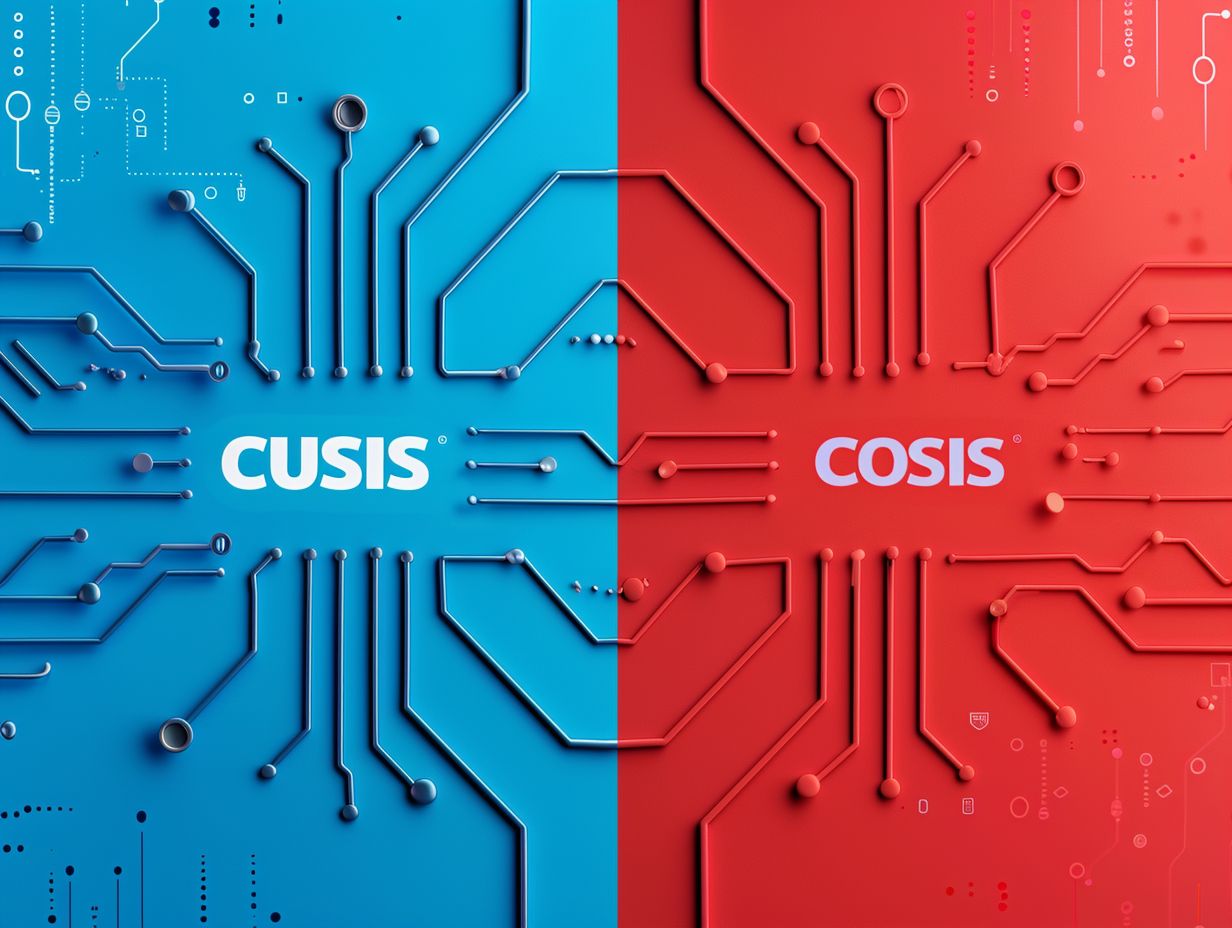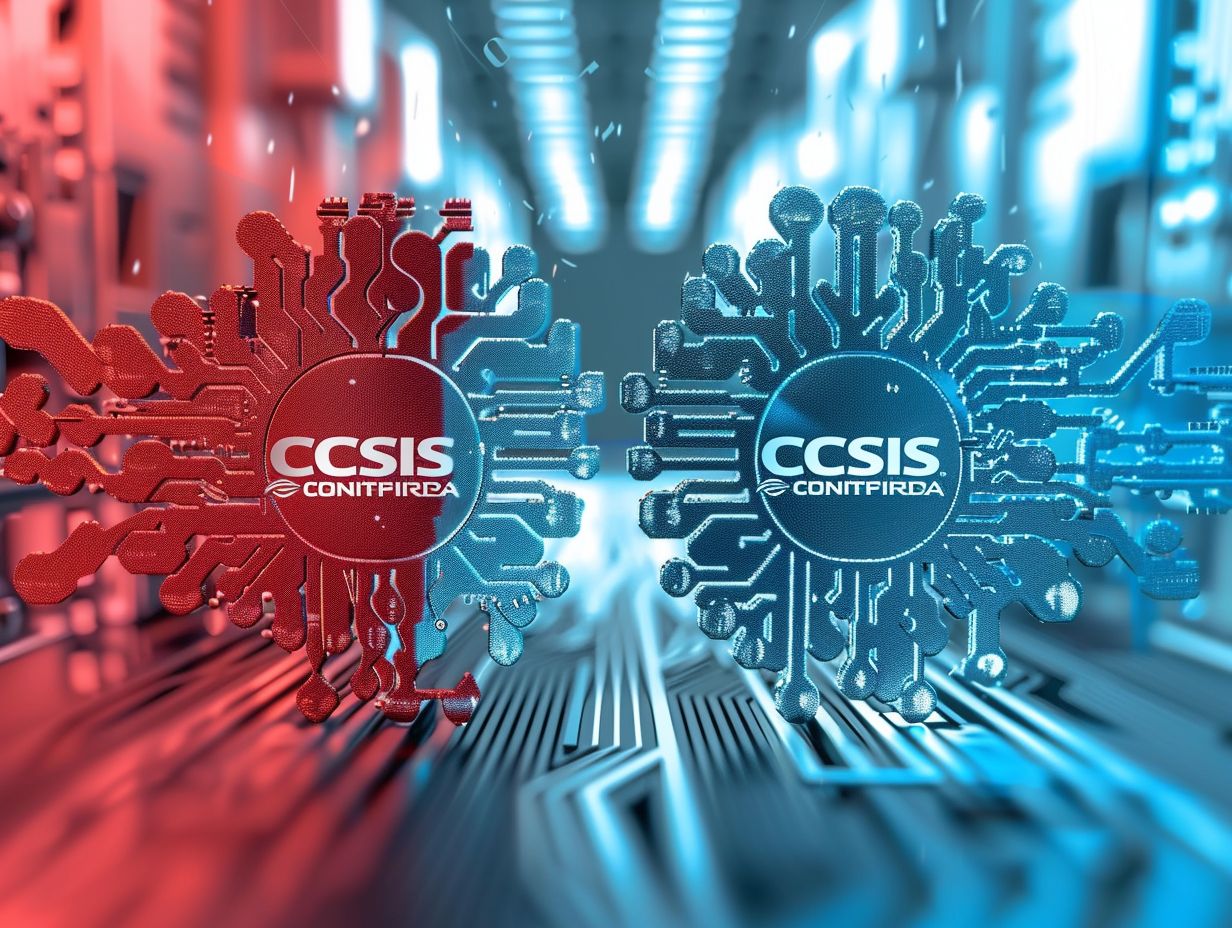If you are seeking to initiate your journey in the IT industry with an entry-level certification, the benefits of both CompTIA and Cisco certifications will be analyzed. These advantages include industry recognition, job prospects, specialized expertise, and professional growth. Moreover, the key distinctions between these two certifications, such as exam structure, expenses, course content, and focus areas, will be outlined.
By the conclusion, you will have gained a more comprehensive comprehension of the factors to contemplate when opting between CompTIA and Cisco certifications, taking into account your career aspirations, job prerequisites, personal preferences, and learning approach.
Key Takeaways:

Overview of Entry-Level Certifications
Entry-level certifications play a crucial role in your career advancement as an IT professional, providing you with a strong foundation in networking concepts and skills. Certifications such as CompTIA Network+ and Cisco Certified Network Associate (CCNA) are highly sought after by individuals like yourself who are aiming to enter the field of network administration and secure lucrative job opportunities.
These certifications not only validate your expertise but also give you a competitive advantage in an industry that is constantly evolving. Achieving certifications like CompTIA Network+ or CCNA showcases your proficiency in areas such as network configuration, troubleshooting, and security protocols, which are essential for success in IT environments. Holding these certifications can result in increased earning potential and enhanced job security, as companies prioritize hiring professionals with recognized qualifications.
In a technology landscape that is always progressing, it is essential for you to stay updated with current certifications to remain relevant and competitive in the IT job market.
Benefits of CompTIA Certifications
CompTIA certifications provide you, as an IT professional, with vendor-neutral validation of your networking skills, making you versatile and adaptable across various IT environments. These certifications are recognized globally and serve as a testament to your proficiency in IT concepts and technologies.
In the industry, CompTIA certifications are highly regarded for offering a broad spectrum of knowledge that is not tied to any specific technology vendor, allowing you to demonstrate your expertise across different platforms. This versatility enables you to work on a wide range of projects and adapt to evolving technology landscapes with ease. The global recognition of CompTIA certifications opens doors to opportunities worldwide, showcasing your commitment to continuous learning and mastery of essential IT competencies.
Industry Recognition and Job Opportunities
Certifications such as CompTIA Network+ and Cisco CCNA are highly esteemed within the industry, offering a multitude of job prospects for certified IT professionals. These certifications not only affirm the individual’s IT expertise but also act as a gateway for career progression in the IT domain.
By possessing these certifications, you showcase a profound comprehension of networking concepts, security protocols, and infrastructure management, positioning you as a sought-after professional in the competitive IT job landscape. Employers frequently prioritize candidates with recognized certifications, recognizing them as individuals who have dedicated time and effort to refining their skills. These certifications establish a structure for ongoing learning and growth, guaranteeing that IT professionals remain pertinent in a continually evolving industry.
Benefits of Cisco Certifications

Cisco certifications, such as CCNA, CCNP, and CCIE, provide IT professionals like yourself with specialized knowledge and expertise in working with Cisco products and technologies. These certifications serve to not only enhance your understanding of networking but also validate your proficiency in effectively utilizing Cisco solutions.
By achieving these certifications, you demonstrate your capability to design, implement, and troubleshoot Cisco networks, enabling you to excel in your role within the IT industry. CCNA imparts fundamental networking skills, while CCNP delves deeper into network troubleshooting and security. On the other hand, CCIE, recognized as the pinnacle of achievement, reflects an expert-level comprehension of Cisco technologies. These certifications not only unlock career opportunities but also establish a robust foundation for IT professionals like yourself to progress in your careers and remain abreast of the latest networking trends.
Specialized Knowledge and Career Advancement
Obtaining the Cisco Certified Network Associate (CCNA) certification equips you with a comprehensive understanding of networking principles and vital skills necessary for excelling in computer networking positions. This certification serves not only to validate your networking competencies but also to create opportunities for career progression within the IT sector.
Professionals who possess a CCNA certification showcase their proficiency in tasks such as network configuration and management, network issue troubleshooting, and network security maintenance. In a job market where the demand for skilled network professionals is increasing, holding a CCNA certification helps distinguish you from your peers. Employers recognize the value of the specialized knowledge and practical expertise associated with CCNA certification, making it a highly desirable qualification for roles like network administrator, network engineer, or network analyst.
Key Differences Between CompTIA and Cisco Certifications
Regarding CompTIA certifications, they are designed to offer vendor-neutral validation of networking skills. In contrast, Cisco certifications are vendor-specific and concentrate on mastering the usage of Cisco networking tools and technologies. The key difference between the two lies in the certification approach and the depth of knowledge in vendor-specific environments.
CompTIA certifications, such as A+, Network+, and Security+, provide a broad coverage of foundational networking concepts that are relevant across various vendors and technologies. This broad applicability makes CompTIA certifications an excellent option for individuals looking to establish a solid foundational knowledge of networking principles without being restricted to a specific vendor.
On the other hand, Cisco certifications like CCNA and CCNP are highly esteemed in the industry for their detailed focus on Cisco’s proprietary networking solutions. This makes them particularly suitable for professionals aiming to specialize in Cisco networking technologies. Each certification path offers unique benefits depending on the individual’s career objectives and desired areas of expertise.
Exam Format and Cost
When pursuing IT certifications such as CompTIA and Cisco exams, you will encounter variations in format and cost, with certain certifications necessitating multiple exams for successful completion. Although there is an initial investment associated with certification exams, the potential salary increase and career advancement opportunities they offer often outweigh the costs, positioning them as a strategic decision for IT professionals.
Earning these certifications can unlock access to lucrative job roles and significantly contribute to your professional development. For instance, individuals who possess certifications like CompTIA Security+ or Cisco CCNA typically command higher average salaries than their non-certified peers. To excel in these exams, it is crucial for candidates to commit dedicated time to thorough preparation, leveraging resources such as practice tests, study guides, and online courses. Familiarizing yourself with the exam objectives, honing hands-on skills, and engaging in study groups can further bolster your chances of successfully passing these rigorous certification assessments.
Curriculum and Focus Areas

The curriculum of Cisco certifications delves deep into Cisco products, network infrastructure, topologies, and security measures, ensuring that certified professionals like yourself have a comprehensive understanding of Cisco technologies. These focus areas equip you with the knowledge and skills necessary to navigate complex network environments effectively.
Through in-depth study of Cisco products, you will gain proficiency in configuring and troubleshooting Cisco routers, switches, and firewalls, which are crucial components of network infrastructure.
Understanding different network topologies will allow you to design scalable and resilient networks tailored to specific business needs.
Mastery of security protocols will enable you to implement robust security measures, safeguarding networks against cyber threats and ensuring data confidentiality and integrity.
Factors to Consider When Choosing Between Certifications
When deciding between certifications like CompTIA and Cisco, you should carefully consider your career goals, job requirements, and personal interests to select the certification path that aligns best with your professional aspirations. Each certification offers unique benefits tailored to different career paths and objectives.
CompTIA certifications, such as A+, Network+, and Security+, focus on foundational skills and knowledge that are beneficial for professionals starting their IT careers or looking to broaden their expertise in various IT domains. On the other hand, Cisco certifications, like CCNA and CCNP, are recognized for their emphasis on networking technologies and advanced routing and switching capabilities, making them ideal for individuals aspiring to specialize in network infrastructure and administration roles.
By understanding the specific industry demands and growth opportunities associated with each certification path, IT professionals can make informed decisions that lead to successful career advancement.
Career Goals and Job Requirements
To achieve your career goals and meet job requirements, IT professionals can benefit from engaging with the IT community, accessing relevant training resources, and utilizing study materials tailored to entry-level roles. Active participation in the IT community and continuous learning are key elements in advancing your career in the IT sector.
Being actively involved in the IT community opens doors to networking opportunities, knowledge sharing, and staying abreast of industry trends. By leveraging training resources and study materials specific to entry-level positions, you can build a strong foundation for growth.
Embracing continuous learning not only enhances your technical skills but also fosters a mindset of adaptability in a rapidly evolving field like IT. Community involvement not only enriches your professional network but also provides avenues for mentorship and collaboration, creating a supportive environment for your career progression.
Personal Interests and Learning Style
When selecting certifications, consider personal interests and learning style to guide you, as an IT professional, towards pathways like Azure, Synapse Analytics, AWS, or Google Cloud, leading to specialized roles such as Cloud Engineer or Cloud Solutions Architect. Matching your certification choices with your personal preferences can enhance motivation and performance in the IT field.
This alignment between your personal interests and certification choices not only boosts your enthusiasm but also propels you towards success in specialized IT careers. For example, if you enjoy working with data and analytics, you may find pursuing certifications in Synapse Analytics particularly satisfying. On the other hand, if you have a knack for problem-solving and infrastructure management, you could excel in certifications related to AWS or Google Cloud. By following these tailored pathways, aspiring Cloud Engineers or Cloud Solutions Architects can harness their passions to drive their professional growth and fulfillment.
Frequently Asked Questions

What are the main differences between CompTIA’s and Cisco’s entry-level certifications?
CompTIA’s entry-level certifications cover a broad range of IT skills, while Cisco’s focus specifically on networking. CompTIA certifications are vendor-neutral, while Cisco’s are vendor-specific.
Which certification should I choose if I want to work in the IT industry?
If you are looking to work in various IT roles, such as technical support or help desk, CompTIA’s entry-level certifications may be a better fit. However, if you want to specialize in networking, Cisco’s certifications would be more beneficial.
What are the career opportunities for each certification?
CompTIA’s certifications can lead to careers in a variety of IT fields, including cybersecurity, networking, and cloud computing. Cisco’s certifications are more focused on networking, with potential job titles such as network engineer or network administrator.
What are the costs associated with each certification?
The cost of each certification varies, but generally, CompTIA’s certifications are less expensive than Cisco’s. Additionally, CompTIA offers discounted exam vouchers for students and military personnel.
How long does it take to study for each certification?
The time it takes to prepare for each certification varies depending on your prior knowledge and experience. On average, it takes about 3-6 months to prepare for CompTIA’s entry-level certifications and 6-9 months for Cisco’s.
Are there any prerequisites for these certifications?
Most CompTIA certifications do not have any prerequisites, but some, like the Security+ certification, require you to have prior knowledge and experience. On the other hand, Cisco’s entry-level certifications require the completion of a lower level certification before you can move on to the next level.
